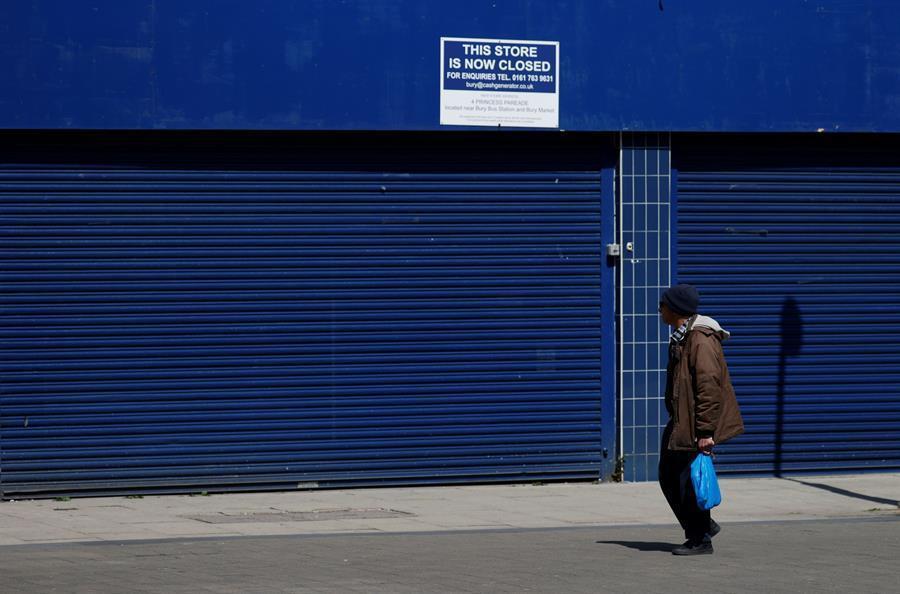
A person walks past a closed shop in Bury, following the outbreak of the coronavirus disease (COVID-19), Bury, Britain, May 7, 2020. (REUTERS Photo)
We hear so many predictions for the way that the world might be changing for the better in the aftermath of the COVID-19 pandemic. There is currently a genuine hope that humanity will learn so many significant lessons from the ills of the way we currently live, consume and run our societies.
However, once the immediate impact of the pandemic lessens and become more habitual over the next few months, there is a risk of the current ‘lessons-to-be-learnt’ agenda losing its attractiveness. Returning to the ‘old normal’ might unfortunately, become more appealing. This is why and how such an eventuality could possibly be avoided!
First of all, expecting huge shifts in all aspects of what we do and how, would likely demand almost a complete overhaul of our affairs from our immediate communities to global relations.
Subsequently, as this would really test humanity’s ability to change, there is always a risk for such a progressive agenda being sidelined. Instead, we might opt for scapegoating! Such a scapegoat might be different from country to country such as migrants, gays or nudity on TV in some and the act of devious external actors in others, or simply China for the most, as it is where the pandemic started a few months ago.
If we do not want scapegoating to dominate the agenda, then we would need to start a comprehensive soul searching for this, and higher education institutions could be well placed to run the ‘truth and reconciliation’ commissions of this process. There is currently a flourishing energy for change globally, but to place this in a sound framework and progress effectively, we first, need to identify the root causes of the problems.
The change agenda is clearly huge and whether this is in regard to the exploitation of the nature unsustainably, leaving global injustices unaddressed, acting unethically in governance, ignoring the plight of vulnerable populations and many other problems, a separate truth recovery might be required. On the other hand, there is already so much evidence on all of these challenges, so this might be a matter of the collating the necessary information as a result of coordinated partnerships between universities, think-tanks, civil society organizations and governments to provide the information on state of affairs and drivers for change in accessible formats for awareness, systems development and policy changes.
Second, even with the optimistic estimates this pandemic is expected to kill hundreds of thousands and causing major economic losses because of the total and partial shutdown of towns, cities, businesses, transportation links and trade. From the health and education services to logistics, entertainment and finance, almost all sectors have already been badly affected and such effects will be worsening further, and subsequently, will definitely leave long lasting damages. The scale of potential economic problems is such that the European Union is now talking about the need for a new Marshall Plan.
It is the context of such post-pandemic economic challenges that might bring completely different priorities to all of us. Also, certain interest groups who have hugely benefited from the ‘old normal’ might resist to such a change process. For example, they might use the size of economic challenges as an excuse for not wanting to grapple with those challenges in social and political arenas. However, the reasons that made the Marshall Plan a success story in the reconstruction and development of Europe in the aftermath of the WWII were the Plan’s ability to build a strategic vision for the continent and its engagement with difficult socio-political problems.
In other words, the type of changes that most people are hoping for in terms of pushing our societies and policy makers for a better care of the environment and socio-economic vulnerabilities, wiser spending of public money, better disaster management and overall good governance might not necessarily, be happening. To avoid this, the public debate should be shaped in a way that the significance of a holistic approach to the problems will be the norm. Universities and civil society organizations once again, could play a key role in such a mission.
Finally, the fields of disaster management, humanitarian aid and peacebuilding are unfortunately, full of ‘lessons learnt’ type reports from many failures of humanity to prevent conflicts and genocide, respond to refugee crises, prepare for natural disasters and pandemics, and build peace sustainably. However, humanity has a great ability to repeat the same mistakes in these fields not because we do not know what to do any better or there is a lack of studies on those past experiences.
In fact, the reason we find ourselves in the same spot of failures repeatedly is due to the global injustices of decision making, trade and finance. We live in a structurally unfair world with deep gaps between haves and have-nots. Similarly, to expect any major changes for the better in the aftermath of the COVID-19 pandemic would actually require fundamental revisions in policy making and application.
Overall, although hoping for the better is undeniably a good quality of human beings, it can also be quite deceptive and therefore, those positive changes that we expect as a result of this pandemic might just remain as unrealized expectations. Alternatively, we should be getting ready to make some fundamental changes!
*Alparslan Özderdem is the Dean of Jimmy and Rosalynn Carter School for Peace and Conflict Resolution George Mason University.